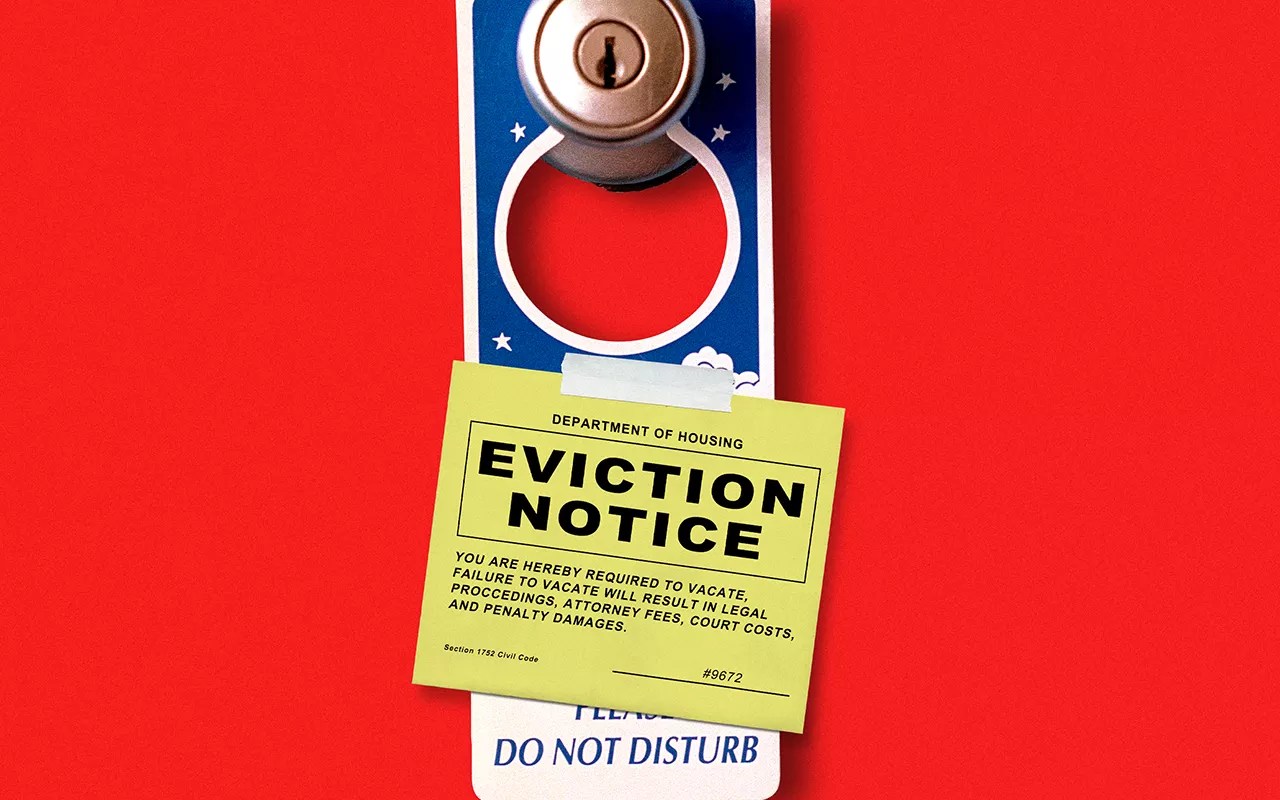
Getty Images

Audio By Carbonatix
On July 22, Steve Naus met Sue Sanders for lunch at the Beau Jo’s in Evergreen, where she was living in her car. With a deep – and depressing – discussion on the menu, their lunch began at noon, and the two friends stayed until about five o’clock in the afternoon.
“She talked about how she had to move up north, that it was too depressing,” Naus says of Sanders, a Littleton native who was 64 years old and had been experiencing homelessness for years.
“I asked her, ‘What are you going to do when the winter hits?’ And she said, ‘I’m not going to have to worry about that, Steve,'” Naus recalls.
Two weeks later, Sanders took her own life. Her body was found in a parking lot in Centennial, inside the car where she’d been spending her nights.
Those close to Sanders say that she wanted to access services and find more permanent housing. At times, she managed to even save up some money. But over the course of the approximately five years that Sanders was living without a home, she was unable to pull herself out of homelessness. She always hit some kind of hurdle. And twice, Sanders had to deal with a town whose rules made it clear that she was not wanted there.
Sanders is gone, but questions about Greenwood Village‘s approach regarding those most in need remain.
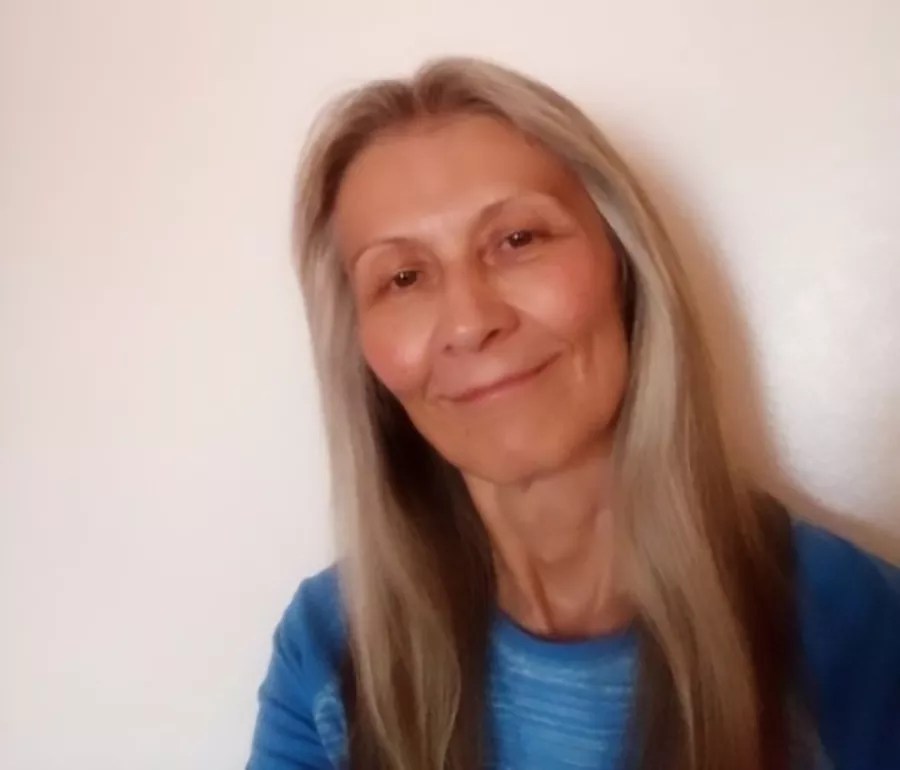
Sue Sanders had been living without a home for five years when she ended her life.
Courtesy of Sue Sanders
By the late 1930s and ’40s, development was starting to spill south from Denver proper. A group of residents who lived in unincorporated Arapahoe County on land once full of fruit orchards and a farm called Greenwood Ranch began fighting projects that wanted to come to their neighborhood. They successfully battled proposals to construct a drive-in movie theater and a large power line. They also opposed Englewood’s plans to condemn land in this pastoral area and use it to build a reservoir for that town’s water supply.
Finally, they decided the best protection would be to incorporate. Charles “Rollie” Enos, a Denver lawyer who lived in the area, proposed incorporating a new municipality that would be three miles long and one mile wide, running from Holly Street to South Clarkson Street between Belleview Avenue and Orchard Road.
The vote to incorporate as Greenwood Village took place in September 1950. One hundred and thirty-eight people came out to vote, and the measure passed 74-64.
Farmers who had opposed incorporation, not wanting development restrictions on their land, filed a lawsuit to nullify the incorporation. But the courts ultimately ruled in favor of incorporation: Greenwood Village was here to stay, an idyllic suburban community.
In 1967, Freda Poundstone moved to Greenwood Village. An influential Republican politician and lobbyist, she soon was pushing the Poundstone Amendment, which would prevent governments – with the big city of Denver the obvious target – from annexing property without the approval of voters in the areas being annexed. Colorado voters approved her proposal in 1974, and Poundstone went on to serve as mayor of Greenwood Village from 1985 to 1989.
The Poundstone Amendment prohibited Denver from gobbling up its little neighbors, including Greenwood Village. But in the process, it also prevented the spread of court-ordered busing from the more racially diverse core city into the almost completely white suburbs. While sprawl continued in the metro area, Denver was confined to staying within its proscribed limits.
Ironically, Greenwood Village had no problem growing through annexation. The town is now double its original size, with all of the additions coming to the east of the original boundaries.
Today, Greenwood Village, which had a population of 15,691 in the 2020 U.S. Census, is known for its economic drivers: office buildings by the Denver Tech Center and an outdoor concert venue, Fiddler’s Green Amphitheatre. The town has an affluent population and the nicest street signs in the metro area.
But Greenwood Village is also unique for an ordinance that its city council passed in 2014, limiting hotel and motel stays to no more than 29 days. While extended-stay lodging facilities with kitchens can host people for longer than that period, any motels or hotels without kitchens are kept to the 29-day limit.
The law is an outlier in Colorado. No other municipalities had a similar ordinance before the pandemic, according to the Colorado Hotel and Lodging Association, although Wheat Ridge adopted a policy in October 2021 that limits the length of stays to thirty days, unless a facility gets a special extended-stay permit.
While Greenwood Village says the law is designed to address life and safety matters, it has other ramifications. Budget motels without kitchens are usually cheaper to stay in than extended-stay motels with kitchens. That means that homeless individuals who can only afford to stay in a cheaper motel – or whose sponsoring organizations are operating on shoestring budgets – will have to leave that motel after 29 days.
While homelessness had long been viewed by many metro suburbs as a Denver-only issue, that opinion is changing. Since 2018, Littleton, Englewood and Sheridan have been collaborating on their approaches to homelessness; together, they hired a homelessness coordinator earlier this year. And the City of Aurora has focused significant resources on homelessness. But other municipalities still don’t view homelessness as an issue they need to address.
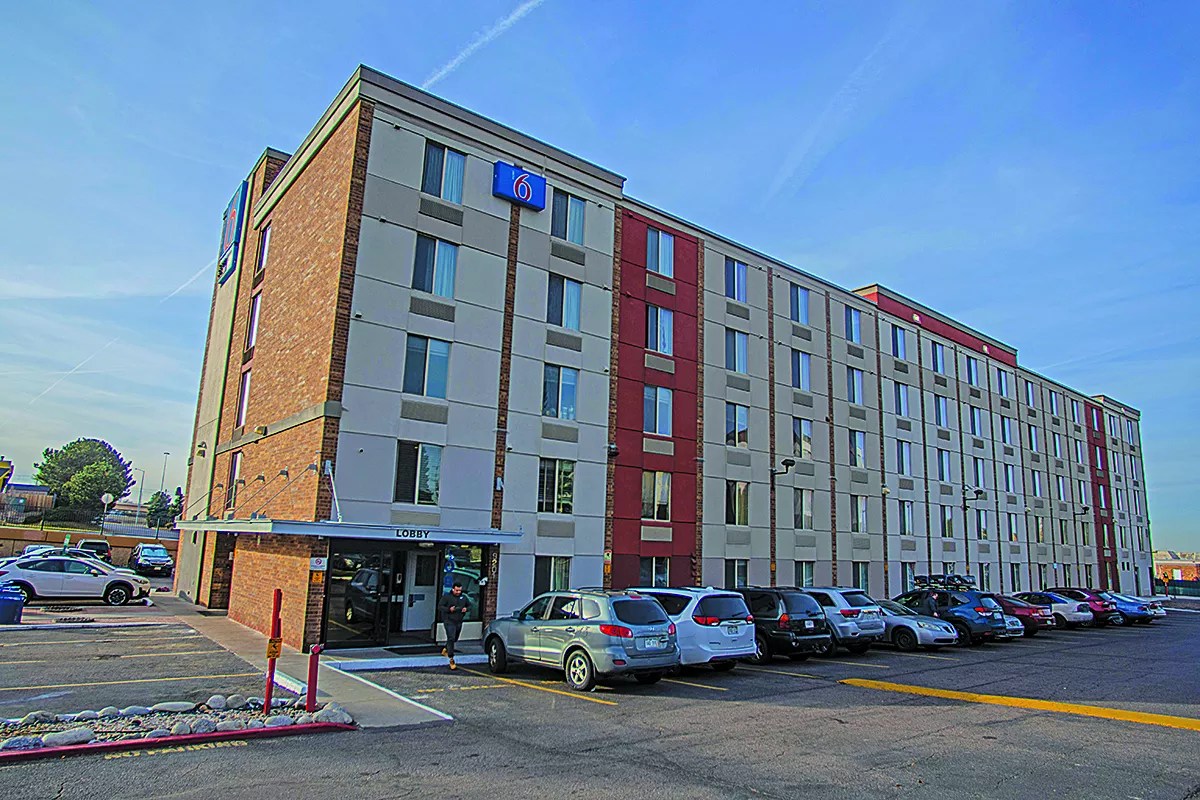
The Motel 6 in Greenwood Village.
Evan Semón
The Greenwood Village ordinance has had an outsized impact on the Motel 6 at 9201 East Arapahoe Road, one of the areas annexed into the suburb. Owned and operated by Neza and Farhang Bharucha, the motel caters to a wide variety of people: concert-goers, tourists, families waiting to move into new homes, and construction workers. And people experiencing homelessness stay at the Motel 6, too.
After Neza Bharucha’s parents immigrated to the United States, they started working at places like Red Lobster and fast-food restaurants to save money. They eventually bought their first motel in Gillette, Wyoming – a Motel 6 – where Neza, then just in the third grade, learned the trade.
“We were helping with housekeeping, taking out the trash. Dad would have us sweep the parking lots on the weekend. We were taking out weeds, shoveling snow,” she recalls. She lived with her family on the second floor of the hotel.
In 2008, Neza’s father, Neville Sarkari, purchased the Motel 6 in Greenwood Village; his wife had developed cancer and was receiving treatment at the University of Colorado Anschutz Medical Campus. She died in 2011.
In the meantime, Neza moved to Atlanta for college and then went on to medical school before returning to Colorado for her medical residency in psychiatry at the University of Colorado hospital. Now 32, she works as a psychiatrist and manages the Motel 6 in Greenwood Village.
She and Farhang bought the motel from her father, who moved back to India. The Bharuchas have three children and a fourth on the way; after living in an apartment on the second floor of the motel, they bought their own home in Greenwood Village.
In March 2020, Sue Sanders was at the beginning of her third year experiencing homelessness. She’d had a troubled past, studded with the tragic deaths of family members, estrangement from her siblings and an abusive relationship. She’d been out of work ever since a workplace accident left her with an injury that required a neck fusion. She lived off of her $1,000 monthly disability payments and had trouble making ends meet. Ultimately, she lost her home.
She had been living in her car in the parking lot of a Walmart in Centennial. Other people experiencing homelessness lived in their cars there, too. She had a membership at a nearby rec center, where she could shower and tidy up. And she had a knack for making useful connections.
“She emailed me saying she was out of resources and very cold,” recalls Stephanie Piko, the mayor of Centennial. She’d begun corresponding by email with Sanders that January, before the pandemic shut down all but essential businesses.
“Because all of the rec centers were closed, she hadn’t had a shower in eleven days,” Piko says.
Sanders’s car was broken down and she couldn’t afford to fix it, so she began searching for a new place to stay. She didn’t want to go to a homeless shelter, since she suffered from a variety of health ailments, including an autoimmune disease, and worried about catching COVID in an enclosed shelter.
Fortunately for Sanders, a church stepped in and gave her a week-long voucher to stay at the Motel 6 in Greenwood Village – the cheapest motel in the area, with rooms at $53 a night.
As the week was coming to a close, Sanders, who was becoming an outspoken advocate in the media for the homeless, posted a note on a NextDoor group for the southern suburbs of Denver explaining her situation. Donations started pouring in, and Sanders was able to cover a full four weeks at the motel.
She contacted Piko after she’d been at the motel around two weeks. “She apologized for not responding to me sooner, but she was just incredibly exhausted from having been so miserable, and she was just glad to sleep,” Piko says.
Sanders stayed busy during her stay in the motel, advocating for those who were experiencing homelessness. And one day, after receiving an Amber Alert on her phone, she saw a car in the parking lot that matched the description of the vehicle cited. She notified authorities, and police came to rescue the kids who had been kidnapped. Although Sanders had trouble helping herself, she liked to help others.
But then in April, day 29 hit, and she had to leave.
“I feel like it’s an attack on somebody that doesn’t make a lot of money,” said Sanders at the time; she’d only just learned of the Greenwood Village ordinance that limited stays to 29 days. “I can’t help it that my disability is only $1,000 a month. I like to live in a city that’s safe as well as they do. I feel like I’m being attacked for it.”
“I like to live in a city that’s safe as well as they do. I feel like I’m being attacked for it.”
Sanders emailed John Jackson – the city manager of Greenwood Village, who’d previously served as its police chief – to ask for “short-term as well as long-term housing options in Greenwood Village.”
Jackson responded that he’d be glad to help connect Sanders to other motels in the area and that she could simply “rent these rooms nightly, for 29 days, and then move over to a different location.” He added that housing wasn’t cheap in Greenwood Village, and even he didn’t live in the town.
“The good news is that there are safe communities all around Greenwood Village that offer much more affordable long-term housing options,” Jackson wrote.
Sanders sent an angry reply: “When you find a place that welcomes you no matter who you are, that doesn’t demand that you have a credit card, put up a deposit, and pay more than you can afford to pay (as only the Greenwood Village Motel 6 does), where you start to feel safe, comfortable, and relaxed, and 29 days later you have to upend your life and drag all of your stuff out, you don’t have a car, and you’ve got to move somewhere else when you don’t want to…you’ve got a whole new load of stress.”
Jackson responded that he was sorry Sanders had sent a “negative attack” when he felt he “could have provided you some help and/or guidance. … I wish you well, please stay safe and healthy.”
At the time, Jackson offered this explanation to Westword: “We’re of the belief, and our ordinance exists, because that’s a safety and public-health issue. If a hotel is not fitted for an extended stay, it’s not conducive to long-term living; we can argue with that all day. But I think we have absolutely prevented some serious issues with what we’ve done.”
According to Naus, who connected with Sanders through her NextDoor posts, the Motel 6 wasn’t exactly luxury living. “There were a lot of police sirens and cop cars in the parking lot every single night,” he says.
But things didn’t get better when Sanders moved. She ended up in a “horrible motel down in Aurora” after she had to leave the Motel 6, says Tawnya Hauer, another person who’d seen Sanders’s NextDoor post and chipped in money.
“Half of the motel had COVID people trying to recover, and the other half had homeless people, and Sue was scared to death going out her door because she had an autoimmune disorder,” Hauer adds. “I would take her groceries and different things down to that hotel, and it was a scary place.”
Sanders liked to keep to herself, especially since she was afraid of contracting COVID. But she had a “big heart” and “would give you the shirt off her back,” according to Hauer. “She had nothing, and she would give you everything. Sue absolutely loved horses. Every dog that walked by, she had to pet it. That was just the kind of heart that she had.”
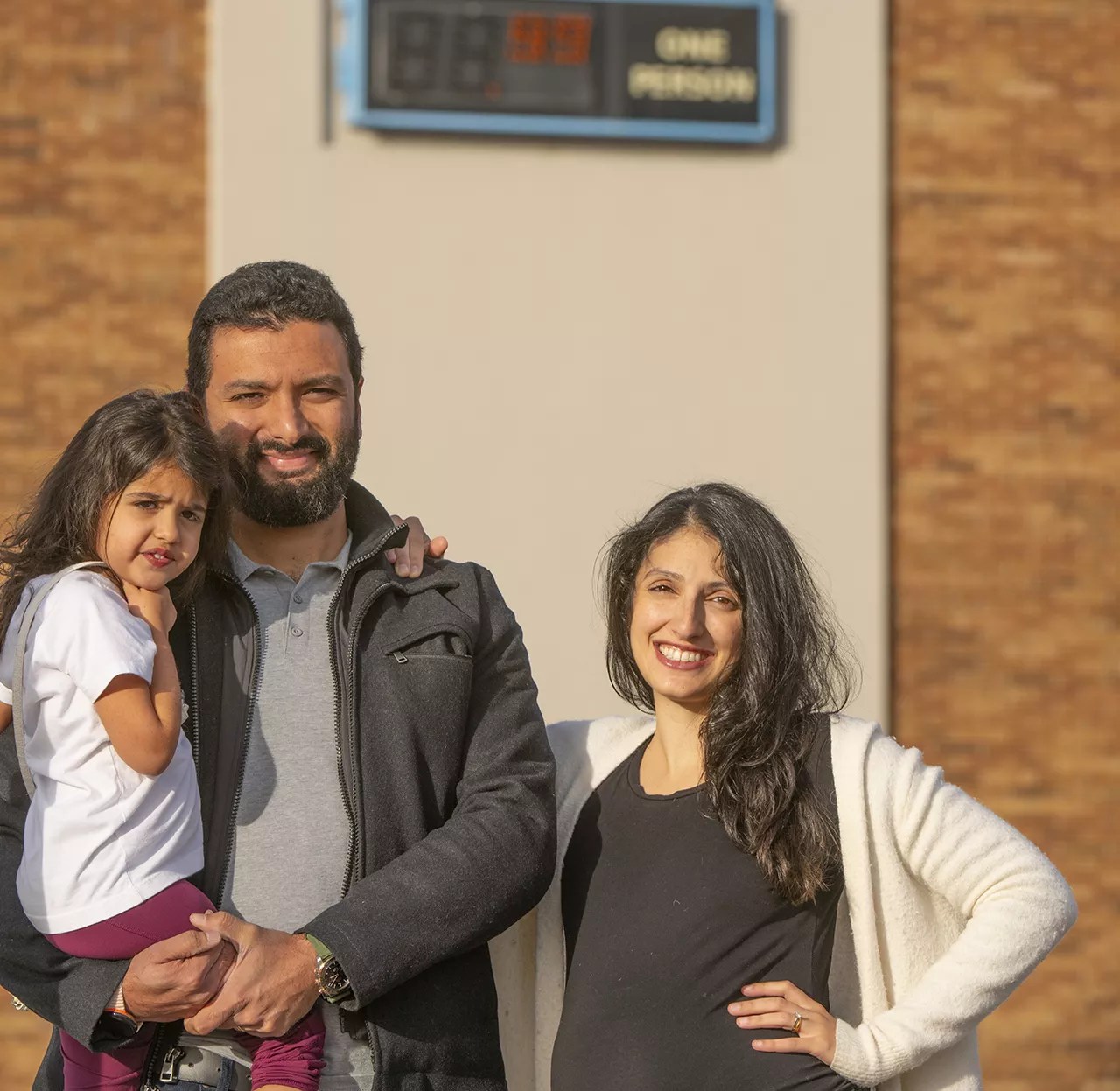
Farhang and Neza Bharucha own the Motel 6 in Greenwood Village, where Sue Sanders stayed.
Evan Semón
In April 2020, as Sanders was moving out, the Motel 6 in Greenwood Village began contracting with SAFER (Solutions for Achieving Fast, Effective Response), a new nonprofit agency that provided short-term housing in a hotel setting “with the goals of health stabilization, basic resource access assistance, employment assistance, and next-step housing for unhoused individuals experiencing mental health and/or substance use concerns at risk of or experiencing justice system involvement.”
Brian Veatch, who works with South Metro Fire Rescue, was a co-founder of SAFER. Often in his job, he would come across individuals with no place to go, including people released from jail in the middle of the night during a snowstorm.
“Many people who live on the street, they have choices, and they would rather live on the street and abide by whatever the restrictions are that the programs offer,” he says. “But some of them don’t have a choice, and that’s the ones we were going after, that want help and didn’t have the resources to do that.”
SAFER got its start as a pilot program, with people pitching in money to cover hotel vouchers. Arapahoe County subsequently began providing funding.
Greenwood Village has an exception to its 29-day ordinance for hotels or motels with a written contract with a “governmental, charitable or insurance agency to house families in crisis who are receiving temporary housing assistance from said governmental, charitable or insurance agency.”
Neza Bharucha thought that the SAFER program definitely qualified.
“Through psychiatry, I’ve met many people from all walks of life, where they are in their lifetime,” she says. “Sometimes a family can just be an individual and their dog. That’s it. That’s the only loving thing that they have left in the world. Sometimes individuals aren’t even lucky enough to have that, and it’s just them. So in my mind, a family is who you have in your support system.”
“So in my mind, a family is who you have in your support system.”
Sanders was able to get back into the Motel 6 that fall through the SAFER program, which found her “at a Walmart parking lot sleeping in her car,” Veatch remembers.
“I think that she may have had some social anxiety or something like that,” he says. “She became really a model participant. She would attend the counseling sessions we would have. She was doing much better, and had we had the ability to get her housed…I think she would’ve done much better.”
But then time ran out. In April 2021, Greenwood Village City Attorney Tonya Haas Davidson sent a letter to Neza Bharucha, telling her that the Motel 6 couldn’t host people placed through the SAFER program for more than 29 days.
“The exception for families in crisis is meant to allow families who are displaced due to an emergency (usually a natural emergency) to stay longer than 29 days. It is not meant for individuals who have been released from jail and have nowhere to go and who are suffering from mental health and/or addiction issues,” Haas Davidson said.
Sanders once again had to leave the Motel 6.
“She was on the waiting list. She was eventually going to get an apartment. I think she was really just devastated,” Bharucha says.
Leaving was doubly difficult because Neza and Sanders had become friends. “She loved Neza. She loved that woman,” Naus says.
SAFER is now staying away from Greenwood Village
“Their goal is to get rid of the types of services that we’re providing. They don’t want to deal with it,” Veatch says. “Their preference would be not to have to deal with those people, and if they can get them to go away from their city, that would be their preference.”
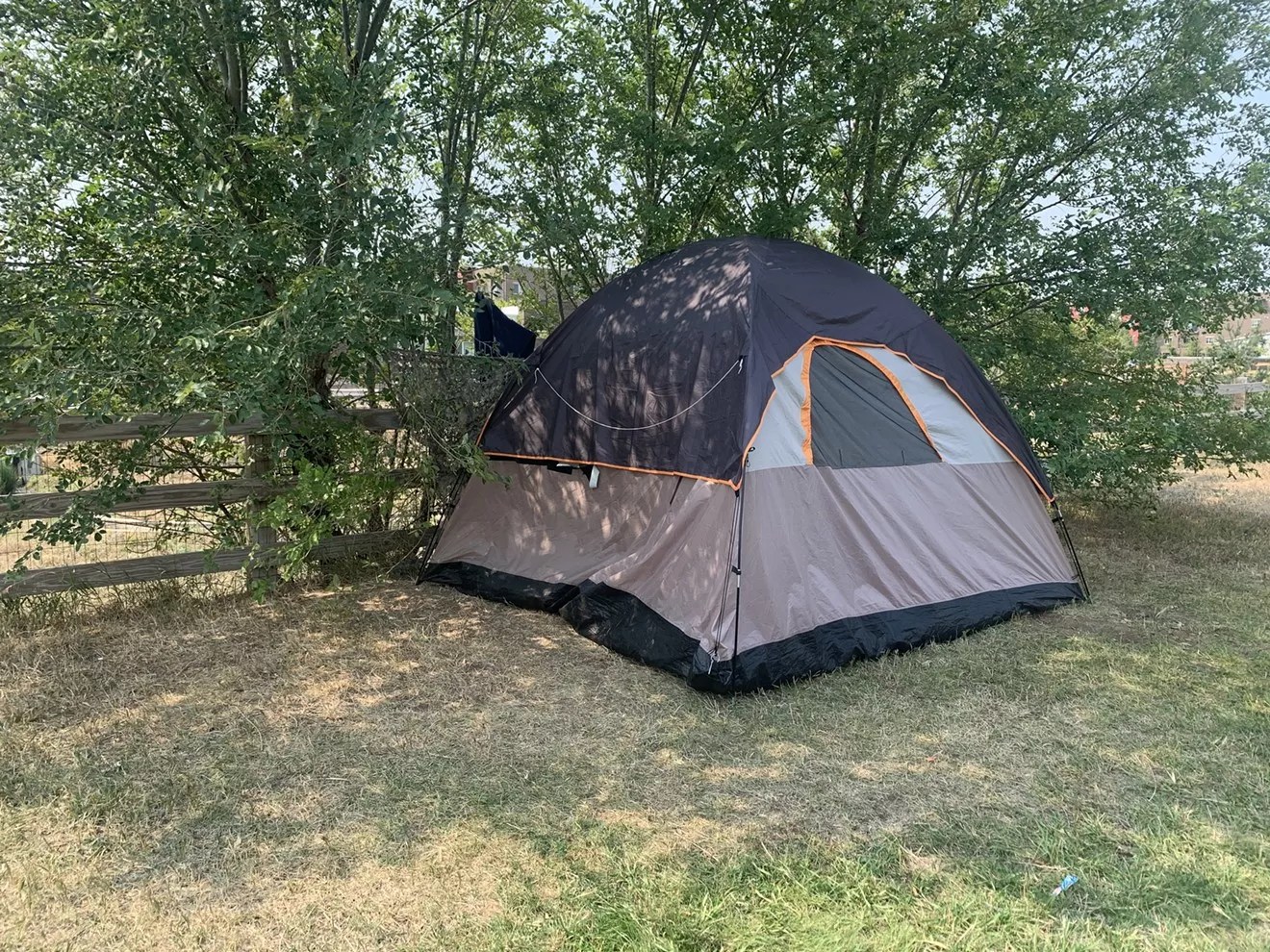
The Poundstone Amendment did not keep homelessness contained in Denver.
Conor McCormick-Cavanagh
After Sanders left the Motel 6, Naus helped her get a room at a cheap hotel in Centennial. She stayed there for around five or six months, and seemed to be feeling a bit happier than usual.
She got back in touch with the Centennial mayor, too. “I know in the summer of 2021, she emailed me that she was going on vacation. She went to Sedona for a vacation, and she got a new car and was very happy that things were going better, and kind of promised herself she wouldn’t get back into this situation again,” recalls Piko.
According to Piko, she tried to connect Sanders with various services. In particular, she wanted to get her into the Julia Greeley Home in Denver, which is a transitional home for single women experiencing homelessness. “I connected her with the managers up there, and they had tried to start the application process with her, and again, she didn’t participate in the application process,” Piko says.
That’s what Piko had seen when trying to connect Sanders with other services. “She seemed to just kind of hit roadblocks, either in the fact that the application processes were too long or the information she needed she couldn’t provide, or she couldn’t check all the boxes, she didn’t have a child or she wasn’t a drug user or things like that,” Piko says.
Over the course of 2022, Sanders’s lifelong health ailments began to creep up on her. By now, she was living in her car again, this time a 2018 Honda Pilot, and the little money she was getting in disability benefits each month wasn’t enough to live on. “She would have to pay her car insurance, her car gas, her P.O. box, her phone bill, her rec center so she could shower, her basic hygiene. By the time she had paid for all of that, she barely had any money left, and with that she would try to get food. And it’s so hard to come out of that,” says Neza Bharucha.
Sanders also had to have her hip replaced. While she was recovering from that surgery, she found out that she’d have to have another hip replacement, according to her cousin, Terry Pierce, who lives in Oklahoma. While Sanders has long been estranged from most of her family, she’d spoken often with Pierce over the last six or so years. She told Pierce that she’d postponed the second surgery and was moving up to Evergreen to get out of the heat.
She also told her cousin that she’d purchased a gun for protection.
When Naus met up with Sanders for lunch and a long conversation, Sanders made it clear that she had reached her limit. “She said, ‘I can’t do this anymore. I’m doing the best I can, but I can’t do it anymore,'” Naus says.
“I can’t do this anymore. I’m doing the best I can, but I can’t do it anymore.”
Naus noticed that Sanders, who normally wore a mask because of her underlying health conditions, wasn’t wearing one that day. “When we said goodbye, she gave me a really long hug and held on tight,” he recalls. “I knew after the conversation that something was going to happen. I didn’t know when or how or why. But I knew. And Sue knew, too.”
On July 31, Sanders texted Naus to invite him to a concert that Piko had organized. Naus was unable to make it, but Sanders still went. The Arapahoe Philharmonic was performing in Centennial Center Park, a park that Sanders loved.
“I ran up to her and gave her a big hug,” Piko remembers. “She was excited to be there and really enjoyed it.”
But on the morning of August 6, Terry Pierce received an ominous note from her cousin:
“I’ve come to the realization that nothing is going to change if I can’t make it happen, and I don’t see any place that I can. I’m growing old waiting for ‘something.’ I’m tired of feeling shame. I didn’t do anything to feel shame except work so hard I got myself hurt and that f***** me for the rest of my life. I can’t make it here in the big city (too many people struggling and fighting for the same dollar) and not in Evergreen where it’s so much more peaceful but too expensive. I’ve got to realize there’s nothing come for me. I don’t know what I’m waiting on or for. Life is what you can scrape out of it or pound out of it and my scraper and my pounder are broken. No dignity there anyway. I’m lacking the tools I need to make my life what I want it to be or something I can live with. I’m feeling like a fool hanging on to a pipedream. I’m out of ideas. Just watching time pass from the same view of my vehicle in a parking lot is not doing a thing for me. Pretty sad.”
Later that day, Sanders shot herself as she sat in the car she’d been sleeping in over the past several months. A groundskeeper found her in a parking lot near Centennial Center Park four days later.
“I was honestly in shock, and I was really upset,” Neza says. “And I couldn’t help but think how things could’ve been different. And I wish I would’ve kept in touch.”
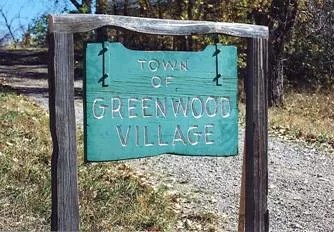
Homelessness has hit the suburbs.
greenwoodvillage.com
Neza might have lost touch with Sanders, but the Motel 6 remained involved with indigent individuals, working with governmental, nonprofit and religious entities to provide rooms for them. A majority of those staying at the motel through these programs leave before the 29 days are up; some are simply swapped to a nearby motel in Centennial.
A few end up staying past the 29 days, since Neza considers them to be families in crisis.
The City of Greenwood Village does not, however.
In August, the city served the Bharuchas with a court order to produce numerous records. In particular, Greenwood Village wants the names and dates of birth of all the individuals who have stayed at the motel using vouchers paid for by third-party organizations. The city also wants to know how long these people stayed. And Greenwood Village wants to see any contracts that the Motel 6 has with these third-party entities, as well as any emails it has related to the SAFER program.
“We, as a business, we are awfully scared of the City of Greenwood Village. It often feels like we are a small tiny fish and the city is a giant shark. And no matter how hard we fight against them, the city, given its resources, can roll us over very easily,” says Farhang Bharucha. “That’s one of the biggest fears that we have. I’m always in favor of swimming with the shark instead of fighting it. It angers me sometimes that we can’t run a legitimate business in the way we are supposed to in accordance with state law and federal law.”
Through a spokesperson, Jackson, the Greenwood Village manager, declined an interview request. Instead, he sent over a statement: “While I cannot comment on specifics as it remains an ongoing investigation, the City remains committed to enhancing public safety for our residents.”
But the Bharuchas are committed to fighting Greenwood Village’s demands for the documents. They’re now working with David Lane, the prominent civil rights attorney from Killmer, Lane & Newman, on getting the order to produce records vacated.
“Greenwood Village is declaring war on the homeless, really. That is exactly what’s happening here,” says Lane, adding that Greenwood Village has opened itself up to a lawsuit based on the 29-day ordinance and what it’s said to the Motel 6 owners.
“Greenwood Village is declaring war on the homeless, really. That is exactly what’s happening here.”
Lane cites the April 2021 letter sent by the Greenwood Village City Attorney to the Bharuchas, highlighting the section about the exception to the 29-day ordinance that states it “is not meant for individuals who have been released from jail and have nowhere to go and who are suffering from mental health and/or addiction issues.”
“That’s an admission by Greenwood Village that they’re violating the ADA,” says Lane. “I’m sure a federal judge will be very interested to see that they are discriminating against people with mental illness.”
Veatch just wishes that Greenwood Village would change the ordinance. “We’re trying to solve the problem, and everybody agrees that we need to do something,” he says, “but it’s the NIMBY problem that we always face, and that’s ‘Well, not in my backyard.’ And that’s the case that was going on with Greenwood Village, that they don’t want to be part of the solution.”
Veatch, who’s become even more committed to SAFER’s work since his son died of an overdose in August, did not know that Sanders had taken her own life until he learned about her death from Westword.
“The bottom line is, I think that Sue walked away from help,” he says. “That’s as big a part of the story as the other. One of the things I hear in the space is you can’t want it more than they do. And that’s very true. We kind of all have to hang out and hope that they don’t die before they change their mind and are willing to accept help.”
According to Megan Copenhaver, a communications officer for Greenwood Village, “John Jackson was saddened to learn of Sue Sanders’s passing, and his condolences go out to her friends and family.”
Andrea Ramsdale, the assistant hotel manager at the Motel 6, got to know Sanders well. “She couldn’t afford to live. That’s so sad. Just so sad,” she says. “She was such a sweet lady. She had a presence with her silence.”
Update: This story was updated on November 17 to include Wheat Ridge’s adoption of limited-stay ordinance in October 2021.